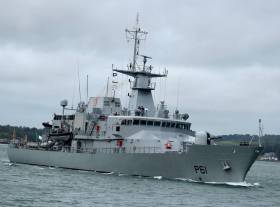Displaying items by tag: staff
Naval Service Is A Sinking Ship With Staff Exodus
In the Irish Examiner's report today the number of sailors leaving the Naval Service paints a grim picture for the future of Ireland’s maritime armed service.
More than 100 members of the service are likely to leave this year alone, amounting to 10% of the force. PDForra, which represents enlisted personnel in the service, fears the number could be much higher.
Coming on top of resignations from the Army, the exodus of highly trained and experienced men and women should be of concern, in particular, to Leo Varadkar, in his dual role of Taoiseach and minister for defence.
For more click here for a link to the story.
Whale Gets Third 'Best Company to Work For' Accolade
#BUSINESS - Water systems firm Whale has featured in The Sunday Times' Best Small Companies to Work For list for the third year running.
The 2012 edition of the list sees the Bangor-based company - and the only Northern Irish representative - rise 19 places to number 77.
Whale was particularly commended for looking after the wellbeing of its staff, its overall ranking of eighth place reflecting the faith in managing director Patrick Hurst and the employees trust in the “sound capabilities” of the leadership.
Patrick Hurst commented: “To be listed again in 2012 is just fantastic for all the team at Whale. Our employees and their attitude and loyalty is what defines the business and is core to its continued commercial success.
"The Whale team in the are a credit to the company and themselves. They have all worked hard together to continually maintain the quality and introduce innovative, market leading products."
Whale (Munster Simms Engineering Limited) is a key player in the leisure marine, recreational vehicle, shower drainage and industrial markets. The company specialises in the design and manufacture of water, waste and heating products including manual and electric freshwater, bilge and waste pumps, Quick Connect plumbing systems, faucets, showers, space and water heaters, and accessories.
Belfast Firm's Big Takeover of Global Marine Business
A Belfast-based company has taken over a global marine business in a £31 million (€35.7 million) deal, the Belfast Telegraph reports.
Survitec Group Limited, based in Dunmurry, has acquired Cosalt Marine, a worldwide supplier of liferafts, lifejackets and survival suits with clients such as the RNLI and P&O Ferries.
Cosalt joins an already bustling portfolio of brands in the Survitec Group, including DSB and Beaufort, as the rebranded Survitec Service and Distribution Ltd.
The company's 450 staff will join the more than 1,000 already employed by Survitec, which operates across the UK and Europe.
The Belfast Telegraph has more on the story HERE.

























